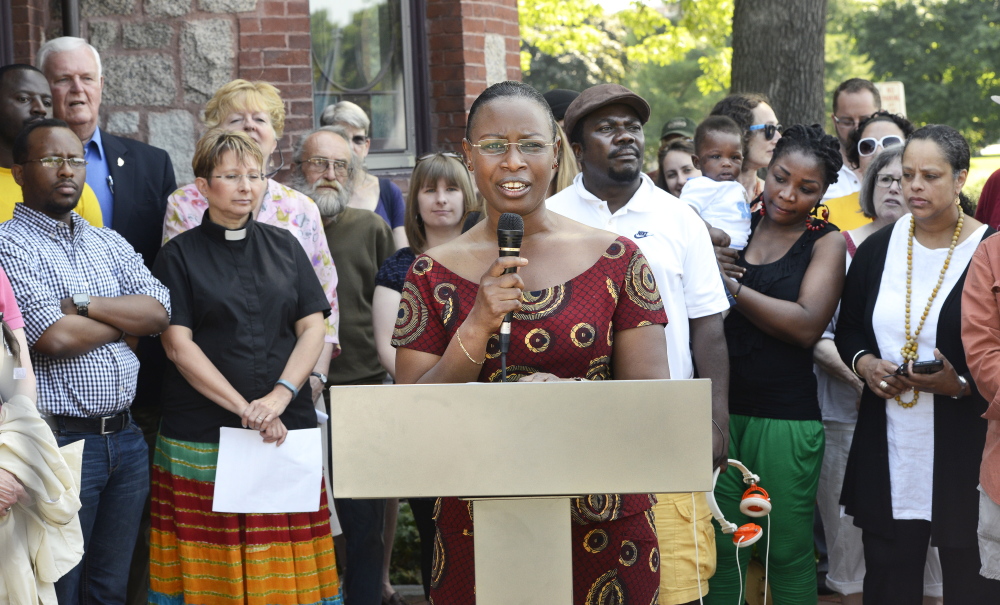Two women who are seeking asylum in the United States have joined the legal fight against a LePage administration policy prohibiting undocumented immigrants from receiving state-funded welfare benefits.
The American Civil Liberties Union of Maine and Maine Equal Justice Partners filed for intervenor status in a lawsuit against the Maine Department of Health and Human Services on behalf of two asylum applicants, Rehma Rebecca Juma of Portland and Suavis Furaha of Westbrook.
A mother of four, Furaha said she decided to be party to the lawsuit “because someone had to do that.”
“I am representing myself as well as many asylum seekers who are in the same situation as me,” Furaha said in an interview.
Last week, the Maine Municipal Association as well as the cities of Portland and Westbrook filed suit in Cumberland County Superior Court seeking to block DHHS from cutting off General Assistance payments to immigrants who were “not lawfully present.” Often referred to as “undocumented immigrants,” that group includes asylum seekers whose visas have expired but who are allowed to stay in the country while their applications are pending.
The LePage administration claims federal law prohibits paying welfare to undocumented immigrants and that the state can no longer afford to provide the benefits. Such immigrants are not eligible for federally funded assistance programs.
Furaha and Juma fled their native country of Burundi because of persecution and are part of a growing number of asylum seekers arriving in Maine from Central African countries torn by war and political repression. Unlike refugees, who are brought to the U.S. through a federal refugee resettlement process, asylum seekers typically arrive in the U.S. on their own with temporary visas and must undergo a lengthy review process with no guarantees.
Both Furaha and Juma depend on municipal General Assistance to pay for basic living costs, such as food and housing, while they wait to receive federal work permits. Asylum applicants must wait 150 days before requesting work permits, although the process can take much longer.
“What we are receiving from General Assistance is just temporary until we receive our work permits,” Furaha said.
The intervenor request claims the recent DHHS policy would likely cause Furaha and Juma to become homeless.
“General Assistance provides temporary support for people who are trying to build a new life after escaping terrible violence,” Robyn Merrill, senior policy analyst with Maine Equal Justice Partners, said in a prepared statement. “The vast majority of people impacted by this change are asylum seekers who are lawfully seeking refuge here. They are caught in legal limbo, unable to work and with few resources.”
DHHS sent a letter to municipalities in June saying it would no longer reimburse towns and cities for General Assistance given to undocumented immigrants. Cities could continue to provide the aid without the state subsidy, which pays 50 percent or more of the cost. Gov. Paul LePage later vowed to withhold all General Assistance money to communities that disregard the DHHS policy directive.
In the suit filed last week, the Maine Municipal Association and the two cities asked a court to block the DHHS policy on grounds that the LePage administration did not go through the rule-making process when changing the General Assistance eligibility standards. Attorney General Janet Mills has also said DHHS should have gone through rule-making, a process that involves public comment and a legal review by her office.
The intervenor request filed on behalf of Juma and Furaha reiterates the concerns over the lack of rule-making but goes a step further, claiming DHHS is violating the women’s equal protection rights under the Maine Constitution.
The LePage administration insists that it is merely following a 1996 welfare-reform law dictating that states cannot provide public assistance to undocumented immigrants unless the state passes a law specifically authorizing the expenditure. Maine has no such law, LePage and DHHS officials have said.
But critics of the DHHS policy said Maine’s General Assistance policies require them to provide financial aid to anyone in need.
Meanwhile, concerns are rising that the surge in unaccompanied minors crossing the United States’ southern border could monopolize federal resources and add to the delays faced by asylum seekers in Maine and elsewhere around the country. With Washington largely paralyzed by election-year politics, it is unclear whether Congress will agree on how to respond to the flood of Central American juveniles entering the U.S.
On Thursday, Maine Sen. Angus King wrote a letter to Attorney General Eric Holder and Homeland Security Secretary Jeh Johnson urging their agencies not to divert funds from other areas.
“I am concerned that if resources are directed toward the crisis at the southern border, these wait times will only increase,” wrote King, an independent. “Delay in providing asylum applicants with timely decisions on their cases, as well as delaying work authorization, places a large burden on the applicants, their families and their communities in Maine.”
Send questions/comments to the editors.




Success. Please wait for the page to reload. If the page does not reload within 5 seconds, please refresh the page.
Enter your email and password to access comments.
Hi, to comment on stories you must . This profile is in addition to your subscription and website login.
Already have a commenting profile? .
Invalid username/password.
Please check your email to confirm and complete your registration.
Only subscribers are eligible to post comments. Please subscribe or login first for digital access. Here’s why.
Use the form below to reset your password. When you've submitted your account email, we will send an email with a reset code.